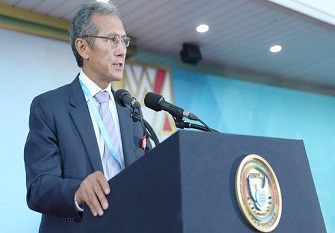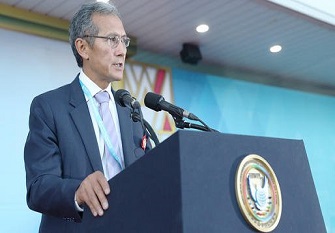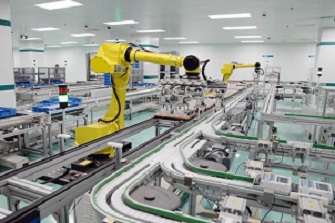Focus
Your Present Location: HOME> Focus-

Danilo Türk: What the world can learn from China's fight against COVID-19
A few days later it was officially announced that the coronavirus hit Europe in unexpected places in northern Italy. This is no longer a matter of an individual case but a beginning of an epidemic. Stories about the COVID-19 are now dominating the media in Europe.
2020-02-27 -

Djoomart Otorbaev: China's Fight Against COVID-19: A Sense of Responsibility to The World
At this critical time in fighting the coronavirus, I would like to express my genuine and deep sympathy for the people of China, and to pray for final victory over the deadly disease. So many innocent people have lost their lives; so many families have lost their loved ones.
2020-02-27 -

Djoomart Otorbaev: China's Fight Against COVID-19: A Sense of Responsibility to The World
At this critical time in fighting the coronavirus, I would like to express my genuine and deep sympathy for the people of China, and to pray for final victory over the deadly disease. So many innocent people have lost their lives; so many families have lost their loved ones.
2020-02-27 -

Zhao Minghao: Mitigating the impact of COVID-19 on global economy is an urgent call
As the epidemic escalates, global coordination and cooperation become more important. On the one hand, the role of the World Health Organization (WHO) and the UN agencies needs to be given full play. On the other hand, countries must step up the alignment of economic policies. Protectionism is not a good way to revitalize the economy, nor is it good for fighting the epidemic.
2020-02-27 -

A Non-traditional Security Theat | The Novel Outbreak
The world has become complacent to the emergence of new viruses, relying on advancement in science and medicine, and wrongly believing that there will be a cure for every illness.
2020-02-26 -

Wang Wen: China’s glory and dream reflected in an ordinary man’s unusual life
There are always heroes and cowards. This is a time when courage and timidity, misery and glory, and anxiety and hope coexist. As US reporter William Manchester carefully reported in his book The Glory and the Dream: A Narrative History of America, 1932-1972, China also has its own compelling stories in the domains of politics, economy, culture and social life over the past four decades. Unfortunately, neither Chinese nor Western media outlets have accurately recorded this era of complexity and diversity.
2020-02-25 -

Wang Wen: China’s glory and dream reflected in an ordinary man’s unusual life
There are always heroes and cowards. This is a time when courage and timidity, misery and glory, and anxiety and hope coexist. As US reporter William Manchester carefully reported in his book The Glory and the Dream: A Narrative History of America, 1932-1972, China also has its own compelling stories in the domains of politics, economy, culture and social life over the past four decades. Unfortunately, neither Chinese nor Western media outlets have accurately recorded this era of complexity and diversity.
2020-02-25 -

Wang Wen: China’s glory and dream reflected in an ordinary man’s unusual life
There are always heroes and cowards. This is a time when courage and timidity, misery and glory, and anxiety and hope coexist. As US reporter William Manchester carefully reported in his book The Glory and the Dream: A Narrative History of America, 1932-1972, China also has its own compelling stories in the domains of politics, economy, culture and social life over the past four decades. Unfortunately, neither Chinese nor Western media outlets have accurately recorded this era of complexity and diversity.
2020-02-25 -

Wang Wen: China’s glory and dream reflected in an ordinary man’s unusual life
There are always heroes and cowards. This is a time when courage and timidity, misery and glory, and anxiety and hope coexist. As US reporter William Manchester carefully reported in his book The Glory and the Dream: A Narrative History of America, 1932-1972, China also has its own compelling stories in the domains of politics, economy, culture and social life over the past four decades. Unfortunately, neither Chinese nor Western media outlets have accurately recorded this era of complexity and diversity.
2020-02-25 -

Wang Wen: China’s glory and dream reflected in an ordinary man’s unusual life
There are always heroes and cowards. This is a time when courage and timidity, misery and glory, and anxiety and hope coexist. As US reporter William Manchester carefully reported in his book The Glory and the Dream: A Narrative History of America, 1932-1972, China also has its own compelling stories in the domains of politics, economy, culture and social life over the past four decades. Unfortunately, neither Chinese nor Western media outlets have accurately recorded this era of complexity and diversity.
2020-02-25 -

Wang Wen: China’s glory and dream reflected in an ordinary man’s unusual life
There are always heroes and cowards. This is a time when courage and timidity, misery and glory, and anxiety and hope coexist. As US reporter William Manchester carefully reported in his book The Glory and the Dream: A Narrative History of America, 1932-1972, China also has its own compelling stories in the domains of politics, economy, culture and social life over the past four decades. Unfortunately, neither Chinese nor Western media outlets have accurately recorded this era of complexity and diversity.
2020-02-25 -

Wang Wen: China’s glory and dream reflected in an ordinary man’s unusual life
There are always heroes and cowards. This is a time when courage and timidity, misery and glory, and anxiety and hope coexist. As US reporter William Manchester carefully reported in his book The Glory and the Dream: A Narrative History of America, 1932-1972, China also has its own compelling stories in the domains of politics, economy, culture and social life over the past four decades. Unfortunately, neither Chinese nor Western media outlets have accurately recorded this era of complexity and diversity.
2020-02-25 -

Wang Wen: China’s glory and dream reflected in an ordinary man’s unusual life
There are always heroes and cowards. This is a time when courage and timidity, misery and glory, and anxiety and hope coexist. As US reporter William Manchester carefully reported in his book The Glory and the Dream: A Narrative History of America, 1932-1972, China also has its own compelling stories in the domains of politics, economy, culture and social life over the past four decades. Unfortunately, neither Chinese nor Western media outlets have accurately recorded this era of complexity and diversity.
2020-02-25 -

Eight negative arguments smearing China’s virus fight must be refuted
The COVID-19 outbreak in China has begun to decline outside Hubei Province, meanwhile in some countries it is on the rise. This fully shows that the epidemic is a challenge faced by all humanity and needs to be addressed by all countries. China's experience in combating the outbreak shows that timely, accurate and authoritative information disclosure is crucial. However, "negative energy" arguments in the public opinion field, which undermines the solidarity and cooperation between human beings and even creates panic out of nothing, will harm the efforts to fight the epidemic and can be called a "tumor" in the public opinion field during the epidemic.
2020-02-25 -

Wang Wen: China’s glory and dream reflected in an ordinary man’s unusual life
There are always heroes and cowards. This is a time when courage and timidity, misery and glory, and anxiety and hope coexist. As US reporter William Manchester carefully reported in his book The Glory and the Dream: A Narrative History of America, 1932-1972, China also has its own compelling stories in the domains of politics, economy, culture and social life over the past four decades. Unfortunately, neither Chinese nor Western media outlets have accurately recorded this era of complexity and diversity.
2020-02-25 -

Wang Wen: China’s glory and dream reflected in an ordinary man’s unusual life
There are always heroes and cowards. This is a time when courage and timidity, misery and glory, and anxiety and hope coexist. As US reporter William Manchester carefully reported in his book The Glory and the Dream: A Narrative History of America, 1932-1972, China also has its own compelling stories in the domains of politics, economy, culture and social life over the past four decades. Unfortunately, neither Chinese nor Western media outlets have accurately recorded this era of complexity and diversity.
2020-02-25 -

Wang Wen: China’s glory and dream reflected in an ordinary man’s unusual life
There are always heroes and cowards. This is a time when courage and timidity, misery and glory, and anxiety and hope coexist. As US reporter William Manchester carefully reported in his book The Glory and the Dream: A Narrative History of America, 1932-1972, China also has its own compelling stories in the domains of politics, economy, culture and social life over the past four decades. Unfortunately, neither Chinese nor Western media outlets have accurately recorded this era of complexity and diversity.
2020-02-25 -

Economic Impact of the Novel Coronavirus Outbreak on China Will Be Temporary
The Chinese government is taking forceful prevention and control measures in response to the recent outbreak of the novel coronavirus, known as Covid-19. The contagion has exerted some downward pressure on China’s economy, but it will not last long. Supported by a resilient economy and ample room for policy adjustments, the People’s Bank of China expects a quick recovery after the outbreak is contained.
2020-02-24 -

Liu Zhiqin: Virus to move China up global healthcare supply chain
Combating novel coronavirus pneumonia (COVID-19) could trigger an earth-shaking change in the world's healthcare industry supply chain. China is set to expand its supply chain in the healthcare industry. China can be the base camp for this radical reform. The country will become both the producer and market of medical products. Financial services, research institutes and biotechnology development related to virus containment have tremendous market value - China can't pass up this opportunity for a strategic shift.
2020-02-21 -

He Weiwen: Flu outbreak reveals US’ true colors
While people in China and around the world are actively cooperating to combat the novel coronavirus pneumonia (COVID-19) outbreak, some US politicians and media are making accusations against China, questioning the effectiveness of its response to the epidemic. However, the US sees frequent outbursts of influenza, and its government not only reacts with extremely low efficiency but also remains silent. The contrast has revealed a US double standard.
2020-02-20
























































































 京公网安备 11010802037854号
京公网安备 11010802037854号





